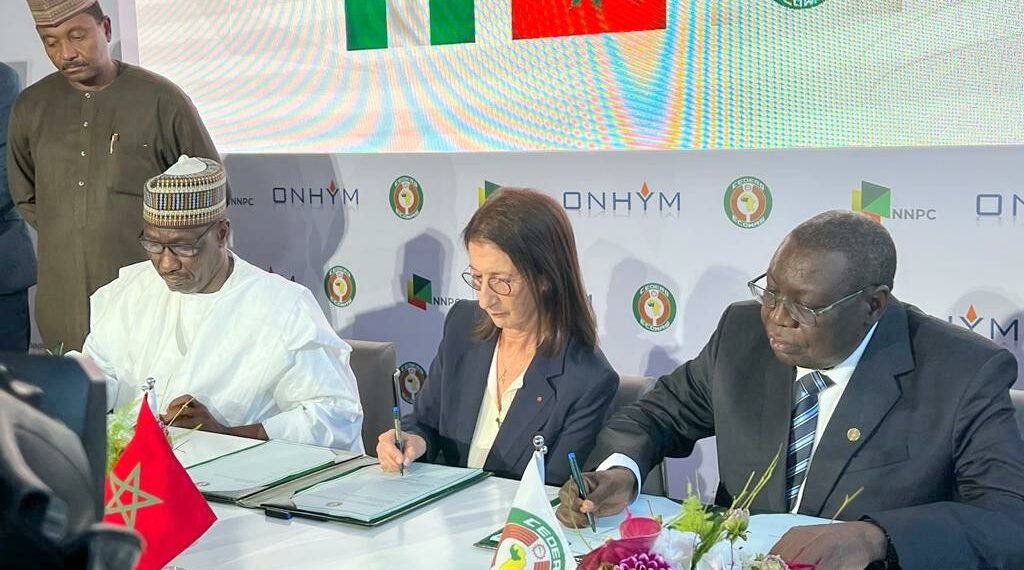
The Nigeria-Morocco Gas Pipeline Project is an initiative of the Federal Government of Nigeria and the Kingdom of Morocco.

The Group Chief Executive Officer of the Nigerian National Petroleum Company Ltd, Mele Kyari, on Thursday said the Nigeria-Morocco Gas Pipeline Project will create wealth, and improve the standard of living of countries with the African region.
Mr Kyari said this during the signing ceremony of the Nigeria-Morocco Gas Pipeline Project Memorandum of Understanding.
The agreements were between
NNPC, ONHYM and ECOWAS;
NNPC, ONHYM and SMH; and
NNPC, ONHYM and PETROSEN
ONHYM is the National Office of Hydrocarbons and Mines of Morocco.
At the event which was held in Morocco, Mr Kyari said the gas pipeline project will also help in the mitigation against desertification and other benefits that will accrue as a result of reduction in carbon emission.
He described the event as a very important milestone in the Nigeria-Morocco Gas Pipeline project as it reaffirms the commitment of stakeholders to deliver on the project.
He explained further that the NNPC is well positioned to progress the project by leveraging on its experience and technical capabilities ranging from gas production, processing, transmission and marketing as well as the country’s vast experience in executing major gas infrastructure projects in Nigeria.
From inception of the project to this stage, Mr Kyari said concerted efforts have been made by the Government of Nigeria and the Kingdom of Morocco which led to the very commendable achievements recorded.
He expressed appreciation to King Mohammed VI of Morocco and President Muhammadu Buhari for entrusting NNPC Ltd with this strategic project.
He said, “As you are aware, our countries stand to benefit immeasurably from the execution of the project which extends beyond the supply of gas to energize the countries along the route.
“Some of the benefits include creation of wealth and improvement in standard of living, integration of the economies within the region, mitigation against desertification and other benefits that will accrue as a result of reduction in carbon emission.
“I am glad to say that NNPC is well positioned to progress the project by leveraging our experience and technical capabilities ranging from gas production, processing, transmission and marketing as well as our vast experience in executing major gas infrastructure projects in Nigeria.
“On our part, NNPC Limited will facilitate the continuous supply of gas provide other enablers such as the required land for the first compressor station for the pipeline to be deployed in Nigeria which is among the thirteen stations earmarked along the pipeline route.
“On behalf of the Federal Government of Nigeria, I would like to thank you all as we continue to strengthen our partnership for the benefit of our countries.”
The Nigeria-Morocco Gas Pipeline (NMGP) Project is an initiative of the Federal Government of Nigeria and the Kingdom of Morocco and was conceived during the visit of King Mohammed VI of Morocco to Nigeria in December 2016.
The NMGP Project is aimed at monetization of Nigeria’s abundant natural gas resources, thereby generating additional revenue for the Country, diversification of Nigeria’s gas export routes and elimination of gas flaring.
It will also assist in supplying gas to Morocco, 13 ECOWAS countries and Europe, integration of the economies of the Sub-region, improvement of living standards of people of the Sub-region, creation of wealth and poverty alleviation, assisting in the fight against desertification through sustainable and reliable gas supply as well as providing avenue for other countries along the pipeline route to develop and export their gas.
The pipeline is a 48 Inch X 5,300 Km (Offshore from Barss Island-Nigeria to Dakhla-Morocco) and 56” X 1,700 Km (onshore from Dakhla-Morocco to MEP), with a total length of about over 7,000 Km and about thirteen Compressor Stations.
The pipeline will originate from Brass Island (Nigeria) and terminates at North of Morocco, where it will be connected to the existing Maghreb European Pipeline (MEP) that originates from Algeria (via Morocco) to Spain.
